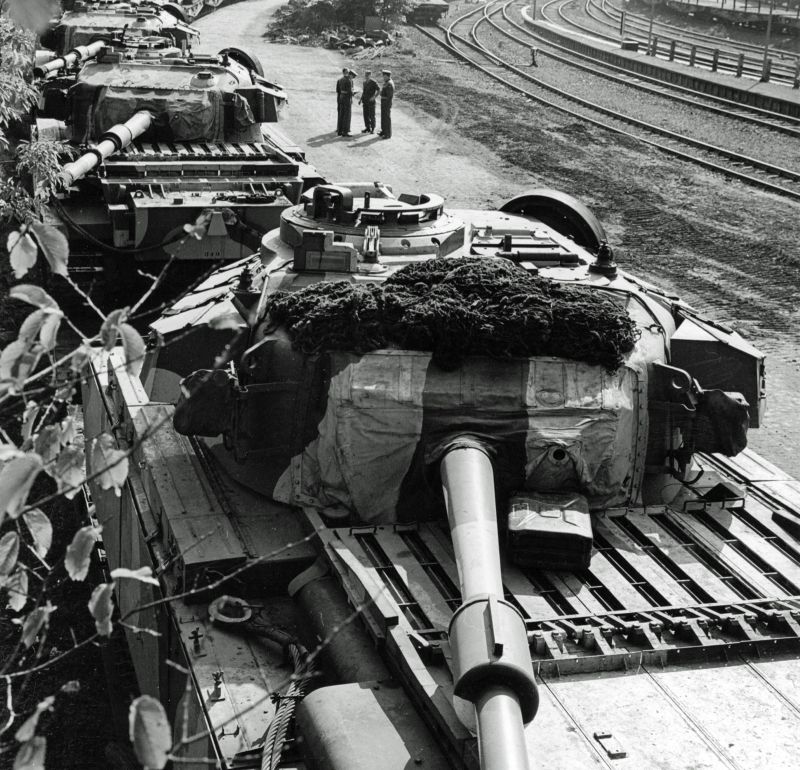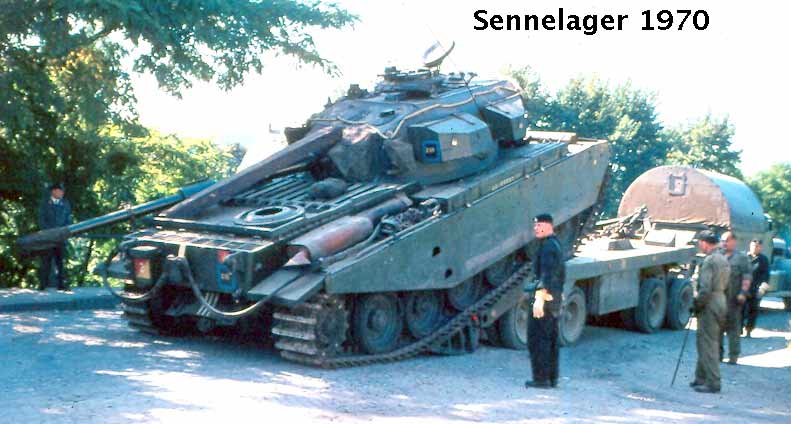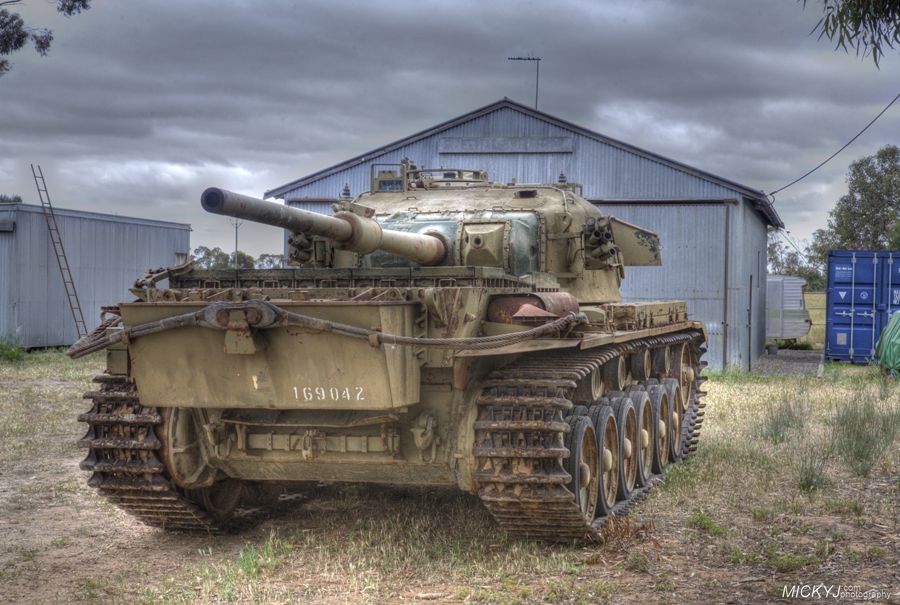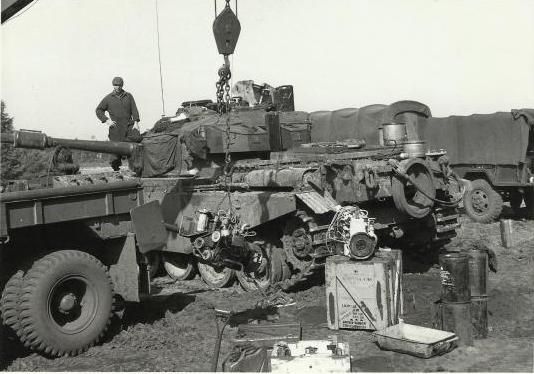
 |
|
#1
|
||||
|
||||
|
Cent Photos,
Jason
__________________
42 Slat grill 43 Ford gpw 44 C15A Wire 5 |
|
#2
|
||||
|
||||
|
Well I used to drive one of those Centurion ARV back the the early 80s
they were brought out of war reserve due to base overhaul on the chieftain ARVs But had fun taking the engines clutch and transmissions final drives and TA wheels Brings back memories Hard to believe the Rolls Royce meteor 27 liter Engine was in the Spitfire but a terrible job changing the plugs |
|
#3
|
|||
|
|||
|
Hi Phillip,
That would be the Rolls Royce Merlin in the Spitfire. The Centurion had the much-modified Merlin called the Meteor, made by Rover. 100 man hours was the listed engine change time for a Cent Mk.5/1, though a competent crew with incentive (like whizzing bullets) could change it in only a few in the field. Mike C |
|
#4
|
||||
|
||||
|
Great photo of the Fort Beausejour tank lines, Jason. I count 45 Centurions in the picture, which would put the date it was taken sometime between 1957 and 1962. The regiments stationed there during those dates were The Royal Canadian Dragoons followed by the 8th Canadian Hussars (Princess Louise's).
Note that some of the gun barrels don't have a fume extractor, while not all have a counter-weight on the muzzle. Finally none of the vehicles have been painted in a camouflage pattern. Again, great photo. Cheers, Dan. |
|
#5
|
|||
|
|||
|
Very nice image.
20 pounder (Tank) Type A barrels had a counterbalance at the muzzle, while Type B barrels (introduced about 1956) had a fume extractor and a 'muzzle swelling'. Balancing the Type B barrel involved welding weights to the topside of the fume extractor. There was also a Type C barrel. All three were interchangeable, but fitting a Type B barrel also involved changes to the depression stop rail around the rear deck, and to the barrel travelling clamp. Mike C |
|
#6
|
||||
|
||||
|
Mike,
Thanks for the info. So, what does the Type C barrel look like? Extractor, no extractor, muzzle shape? I have no idea. Also, what is a 'depression stop rail around the rear deck?' I think I know what that might be, but aren't quite sure. Actually, I would be interested any details which you may have on the Centurion. Modifications and such. Cheers, Dan. |
|
#7
|
|||
|
|||
|
Hi Dan,
Don't know much about the Canadian use of Centurion: suggest Don Dingwall's 'The Centurion in Canadian Service' from Service Publications is a fine start. The Depression Stop Rail was a hard rubber, raised edge around the outer edge of the rear deck to prevent the main armament from fouling the steel deck during traverse. It had to be modified to prevent the B type barrel fume extractor from preventing depression during traverse, and when placing the barrel into the gun crutch. Mods to Centurions, as issued from the British War Office, fill volumes. Simon Dunstan is documenting them all, in a mammoth piece of work that he intends to publish eventually. Mike C |
|
#8
|
|||
|
|||
|
Dan,
Sorry, forgot to say: the Type C barrel had a short counterweight at the muzzle, combined with either a mid-barrel counterweight or fume extractor. It was bored in the barrel for the gas ports, but not necessarily fitted with the fume extractor. If fitted with the mid-barrel counterweight, the gas ports were fitted with threaded plugs. The Type C was sort of a Type A and B all rolled into one. Type A counterweight (muzzle), to be balanced, had an additional length added to the counterweight tube. Mike C |
|
#9
|
||||
|
||||
|
Mile,
Just by happenstance I was surfing through the site 'ruhrmemories.ca' this week. It's been completely revamped and has had some new photographs added. Two of the new photographs show the rear deck of the Centurion tank with 105mm Type B barrels. In both the turrets are reversed and the barrels are clamped to deck. After seeing these I think I know what you mean by the Depression Stop Rail and how (and why) the clamp, or crutch, had to be moved. The DSR are the rubber pads that outline the top edge of the engine deck, while the clamp was moved to the left rear side to accommodate the fume extractor. Am I on the right track? (No pun intended.) Cheers, Dan.   |
|
#10
|
|||
|
|||
|
Dan,
Interesting images. The B&W image shows three Centurions: the two in the background have 105mm Main armament (fume extractor is not concentric, and is square edged), while the closest is a 20-pdr with the rounded, concentric fume extractor and a single counterweight for balance. Cents from at least Mk.3 onwards had the gun crutch on the rear left corner of the hull. The mod was required because the diameter of the B type barrel was slightly larger at that point than the A type barrel. The crutch had to be enlarged just a fraction (but not moved). The colour image shows a Cent with 20pdr main armament moving onto or off (most probably off: no ground guide on the trailer deck directing the driver) a Dyson Mk.3, 50 ton trailer being towed by a Diamond-T tractor. Mike C |
|
#11
|
||||
|
||||
|
Mike,
I will gladly defer to your obvious familiarity with the Centurion, but if I may I would like to play the Devil's Advocate for just a minute. Further to the first photo, I had to crop it down to fit into the window. The actual photo is 1600px and shows an entire squadron of tanks aboard the train. None of the other barrels are visible, but the camouflage pattern of the vehicles suggests that the photo was taken after the July, 1965, changeover to 105mm L7 guns. For that reason I can't understand why there would be any 20-pdr armed tanks still being used. The second photo is dated 1970, but I'll admit that the lack of a camouflage paint job on the tank makes the probable photograph date much earlier. Again, thanks for the new information in your reply. If you don't mind, I still have some more bone questions to ask about the Centurion. Where Type B barrels created from Type A's as a refit at a workshop or depot, or were Type A's and Type B's produced as such at the factory? I had always thought, obviously in error, that the exterior of the 20-pdr and 105mm barrel was the same (Type A or B), and that it was only the interior sleeve that needed to be changed to increase the bore by 21mm. Wrong again? I have a couple of other questions that I have never been able to find an answer to, that I would be embarrassed to ask on an open forum. May I contact you via email for an answer? Cheers, Dan |
|
#12
|
|||
|
|||
|
Hi Dan,
Yes, please PM me if you wish. To answer your questions and queries, the closest tank is armed with a 20-pdr: no 'ifs' or 'buts'. Besides the fume extractor being a 20pdr type (and with the counterweight welded along the top), the mantlet is not fitted with a .50 cal Ranging Machine Gun as were most Mks of Cent fitted with the L7 (the exception is the Brit Mk.6). As to the change over date, like most changeovers, it took time. In the case of the Canadian Army, Dingwall states that not all were changed to the 107mm L7 tank gun anyway. Is this/are these Canadian images? Both Mk.5 (and Mk5/1) with 20pdr and Mk.11 with 105mm were in service at the same time until the Centurion fleet was finally withdrawn from service in the 1970s. So it would be possible to have both on a train somewhere, I suppose. The Type A was not converted to Type B. Type A production stopped when Type B production started. I believe Type C was the conversion of Type A to using a fume extractor, but as Type C were never used in Australia, I have not investigated this aspect in detail . The 105mm L7 does not have a type letter: it came in only one configuration with the eccentric fume extractor. These were all new production barrels. They do fit the 20-pdr breech block. Except for the breech fit portion, I believe the L7 is a slightly larger external diameter at any given point than the 20pdr Type B barrel, and are also larger than the same given point on a Type A barrel (based on a comparison of 105mm L7 fitted to Leopard AS1 and type B barrels fitted to Centurion Mk.5/1). Regards Mike C |
|
#13
|
||||
|
||||
|
Mike,
Again, your knowledge overwhelms me. I've been doing some further research into the Canadian use of the Centurion in Germany, particularly concerning the dates of when changes were made. The only conclusion at which I've been able to arrive is that there is no documented evidence giving these details. Most information is based on best-guesses made from available photographic evidence. And yes, 20-pdrs and L7's could be found being used at the same time. I've also been able to identify where and when the earlier photograph of the the two Mk 5/2's and the Mk 5 was taken. Another version of the photo can be found in the history of the RCAC which states that the tanks belonged to the Fort Garry Horse, the year was 1965, and the location was the rail marshaling yards at Iserlohn. (I should credit the photo to Lt-Col David Summers at this point.) Now, can it be determined if any of the Centurions in the earlier photos have been equipped with an auxiliary 100-gal fuel tank? I understand that being fitted with one allowed the vehicle to have the appellation LR for 'long range.' I think the tanks in the marshaling yards may be so equipped, but not the one unloading from the transporter. Again, right or wrong? As always, awaiting your wisdom. Cheers, Dan. |
|
#14
|
|||
|
|||
|
Hi Dan,
'LR' for 'Long Range' was a British designation, and I'm unsure if it was applied in Canada. It was not applied to Centurions so equipped in Australia. The image of the 45-odd tanks at Fort B: the ones with a visible rear end are not fitted with the auxiliary armoured fuel tank. Neither is the tank in the colour image of the tank unloading. Fitting took some work: welded on mounting pieces, new fuel lines, new four-pipe fuel tap for the 'three tank' configuration (an outlet and three selectable inlets). Unlike the mono-trailer, fuel was drawn directly from the auxiliary tank, and it could be selected from within the vehicle. The tank mod was available as a complete kit from the British Ministry of Supply. The three tanks (a Mk.5 and two Mk5/2) visible on the train: the 'middle' Mk5/2 tank with the 105mm L7 gun is fitted with the auxiliary armoured fuel tank - you can see it protrudes behind the air louvres that normally are the 'back end' of the top of the tank. The infantry telephone, normally mounted vertically on the left side of the air louvre plate, can be seen mounted vertically on the left side of the auxiliary fuel tank. It is not possible to see if the other tanks are fitted with the 'LR tank'. I've also noticed that they are all carrying an extra road wheel mounted on the rear left of the turret - the rim is visible above the top of the turret. This is the position where a set of three track links were normally mounted on tanks not fitted with IR and RMG, but it seems this unit at least changed that to a spare road wheel. Mike C |
|
#15
|
||||
|
||||
|
Mike,
Tonight I've selected a photograph of an Australian Centurion taken by a Michael Jenkin. It's entitled 'Standing Guard' and the comment attached to it says "Coomandook - Dukes Highway - Centurion Tank ARN 169042".  The website that I downloaded this from gives a detailed history of this vehicle, the Centurion and its service in Vietnam. Now let's see if I've learned anything about the Centurion over this past week. This vehicle is armed with a 20-pdr Type B barreled main gun with at least three, if not four, counter weights welded to the fume extractor. (They appear to have been welded parallel and cross-ways to the barrel.) The mantlet is not shrouded in a single piece of painted canvas like British and Canadian Centurions but has a closely fitting piece of canvas covering the main gun and exposing the co-axial machine-gun mount. It's fitted with the 100-gallon auxiliary gas tank with the infantry phone fitted to its left side. The barrel yoke, or crutch as you have referred to it, is open and leaning against the depression stop rail. There is what appears to be an aperture inboard of the co-axial machine gun which may be for a .50-cal ranging machine gun. There are two antenna mounts on the turret roof. I don't know if they are British or American type mounts. Finally, as the turret reloading door is visible I would say that the forward bin box has been removed. I would say it's a Mk 5 possibly with an RMG. What say you? Cheers, Dan. |
|
#16
|
||||
|
||||
|
Mike,
Talk about making a bone move in my previous post. I've just found the site called 'centurion-mbt-two' wherein you provided the detailed history of the Centurion I featured in my previous post. It also has all of Michael Jenkin's photographs. I guess I should've stuck to asking questions about Canadian vehicles instead of trying to show off. Tomorrow I'll have some questions about uparmouring the glacis. Cheers, Dan. |
|
#17
|
|||
|
|||
|
No worries, Dan, happy to answer questions about Cents (the Australian usage has been something of a research project for many years).
I find my 'detailed histories' of individual Centurions popping up in all sorts of places, most without the courtesy of seeking permission and many without crediting me. I'm told by one website (that I do willingly write for) that the article I wrote on 169041, the 'Atomic Tank' as I dubbed it, has been viewed and copied/downloaded many thousands of times. I suppose I should take that as a compliment to the research effort it took to write it. The website you refer to is a particular 'vacuumer' of Cent info and images from all sorts of places. 169042 is indeed a Mk.5/1, but the Australian 'version' with .50 inch L6A1 RMG mounted in place of the .30 cal, which is moved to the right closer to the 20-pdr main armament. The three weights are all parallel to the barrel of the 20-pdr - they are to provide balance at the gun trunnions. Most Aust Cents with B type barrels have three weights, but as few as one large one and as many as 7 have been noted. The weights are not necessarily uniform in size. The extra weights are required to compensate for the additional weight of the combined 30-cal & RMG mount, RMG, and ammo. The RMG combined with the 20-pdr is unique to Australia. The Poms tested the concept of an RMG with that combination on a couple of tanks in the late 50s, then combined the RMG ONLY with the 105mm L7 for service use. The Infantry tank telephone is indeed mounted to the left side of the auxiliary armoured fuel tank, but horizontally, not vertically. There are also some other aspects that are peculiar to Aust Cents, such as the brush guard in front of the gunner's sight. The radio setup is British: a Larkspur SW C42/B47 combination. Regards Mike C |
|
#18
|
||||
|
||||
|
Mike,
Further to the adding of an armour plate to the glacis of the Centurion, I have a few questions. I'm guessing that whatever was already welded to the glacis of a Mk 3 needed to be removed prior to the addition of a new plate. (I'm assuming that it was a single plate of steel, for strength integrity purposes.) When the various furniture that was required on the front of the vehicle was added again, was there a new arrangement that made it visibly different from earlier? Was a plate also added to the bottom of the front of the tank? The part of the bottom that comes up to meet the glacis? Is there a way to immediately tell if the vehicle one is looking at is a Mk 5/1 (uparmoured) or not, especially from a distance or from a side view? Finally, was uparmouring a process that could be accomplished at a Base Workshop or did each vehicle have to go for a full factory refurbishment? Cheers, Dan. |
|
#19
|
|||
|
|||
|
Hi Dan,
The uparmour plate came as a war office kit with installation instructions. First: remove all the 'stuff' from the glacis, weld glacis, re-locate all the 'stuff' back into place. There were plenty of exceptions, however, depending on other requirements and installations, but in general, it was a straightforward process. The plate was to ensure a degree of frontal arc immunity to the Russian/Soviet APDS round fired by the T54. The uparmour was only added to the upper sloping glacis plate. There are a few visible traits: the plate is cut around the towing eye mounts, and there is a chamfering effect let into the top edge of the plate in front of the driver: these can often be readily seen from the front. From the side, the plate is thicker at the top edge, and sticks out a fraction (1.5 inches, I think). Yes, a tank/heavy machinery Base Workshop could handle it: just so long as they had the arc welding capacity. In Australia, it was most often done at rebuild by Bandiana Area Workshop, or to tanks already rebuilt but held in storage at 1COD awaiting issue. Mike C |
|
#20
|
||||
|
||||
|
Mike,
Going back to the first post of this thread, here is the one supposedly depicting a Centurion engine change.  The tank appears to be a Mk 5/1 with a Type B barrel. There is something strange between the bin boxes on the left side of the turret, covering the ammunition loading hatch. There's also the strange placing of the road wheel on the back of the 100-gal tank. Most photos from this time period (mid-60's) show the road wheel located on the rear of the turret where the track-link holders are. It also looks like the infantry telephone is on the rear of the fuel tank, rather than the left side. I'm sure the Centurion spent as much time in the field in this environment as it did on the ranges and in laager. Cheers, Dan. |
|
#21
|
|||
|
|||
|
The engines (one on the hook and one sitting on the crate) look small for truck engines as well. The layout of the small engines looks similar to the image of the charging set engine shown in the User Handbook for the Centurion Mks. 3 and 5 dated 1953. The attached diagram (PDF version 7 or later) is from that manual.
|
|
#22
|
|||
|
|||
|
Dan,
I agree with Grant: the engine is the Auxiliary Generator engine - a Morris 4 cylinder side valve model USNMH Mk2 or Mk2/1. These assemblies required frequent changing in service. The tank is not equipped with an armoured rear fuel tank, hence the infantry phone is still mounted on the rear louvre plate. Might this be a later Mk.7 hull? The spare road wheel is mounted on the same plate, hanging from the tow rope link mount: not unusual, as the carriage of spare roadwheels was not part of the original stowage design, but found to be necessary, hence the position varies quite a bit between units/vehicles. The 'strange' item between the side bins appears to be one of the engine deck covers, raised and leaning against the side of the turret between the bins. It is hard to see for sure. Mike C |
|
#23
|
||||
|
||||
|
Wneh I was working at Hughes Auto Spares I recall a batch of new Ford 10 sidevalve motors which I was told were to do with Centurions. Did we substitute those in Australia?
They sold like hotcakes to guys with Prefects and early Anglias.
__________________
Film maker 42 FGT No8 (Aust) remains 42 FGT No9 (Aust) 42 F15 Keith Webb Macleod, Victoria Australia Also Canadian Military Pattern Vehicles group on Facebook https://www.facebook.com/groups/canadianmilitarypattern |
|
#24
|
||||
|
||||
|
Hi Guys
Here is a photo I took of a Centurion that I am sure would be recognizable to MLU members in Victoria. Sorry no prize for a correct answer. The Centurion at Coomandook South Australia on the Dukes Highway is about an hours drive towards the Victorian Border form me.  Cheers Tony 
__________________
Anthony (Tony) VAN RHODA. Strathalbyn. South Australia |
|
#25
|
|||
|
|||
|
Little Jo.
What are they going to do with that tank? It looks great but would look so much better at my place the wife would love it 
__________________
F60L Cab 12 |
|
#26
|
||||
|
||||
|
Quote:
Bob Mosley and I used to stop and stare at the COOMANDOOK Centurion on our border raids into Victoria. There is no way in hell the guy who owns the one I photographed would part ever with it. HINT to the location. Bob and I collected my MB Willys Jeep from there. HINT HINT.  Cheers Tony 
__________________
Anthony (Tony) VAN RHODA. Strathalbyn. South Australia |
|
#27
|
|||
|
|||
|
Keith, as far as I'm aware, the Ford 10 was not used in the Cent as a replacement.
I think the Coomandook Cent is 169042: it has quite a history. Don't know the ARN of the one in your images, Tony. Dan: scratch my comment about a Mk.7: it's a Mk.5 or 5/1 hull with 'crap' hanging off the air outlet louvre plate. 'Phone is in the normal position. Mike C |
|
#28
|
||||
|
||||
|
Quote:
I have had a close look at the ARN number but can't read them all. I have done some close up shots so maybe this may assist you make it out. Cheers Tony 
__________________
Anthony (Tony) VAN RHODA. Strathalbyn. South Australia |
|
#29
|
|||
|
|||
|
Hi Mike and gents, Its the oil cooler standing between the turret bins, They hinge at the front
Kind regards |
|
#30
|
|||
|
|||
|
Matt,
Yes, of course it is! My error.... It also well illustrates why there are several reports of damage to oil coolers by rotating the turret without first checking that all was clear. In all cases, the offending 'rotator' was charged with 'negligence: member to pay' - an expensive lapse of concentration for a lowly Trooper. Thanks, Matt: just shows that 'hand on' experience is priceless. Mike C PS: The feature article in MMI this coming issue is about the Australian Centurion Driver Training Tank, and Tim Vibert's example in particular. |
 |
| Thread Tools | |
| Display Modes | |
|
|